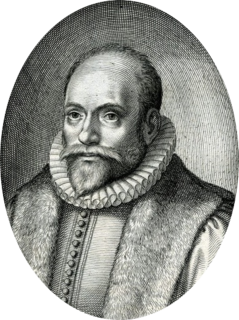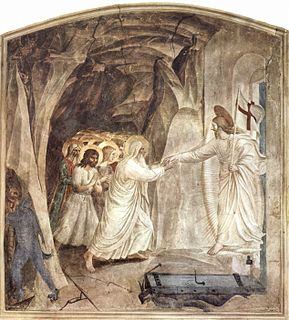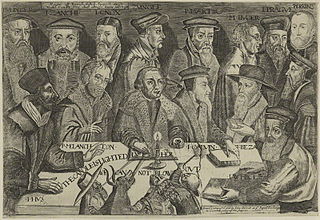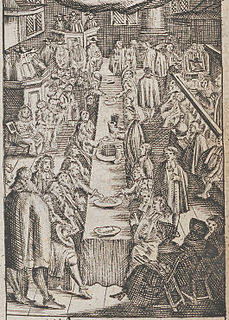Related Research Articles

Arminianism is a branch of Protestantism based on the theological ideas of the Dutch Reformed theologian Jacobus Arminius (1560–1609) and his historic supporters known as Remonstrants. His teachings held to the five solae of the Reformation, but they were distinct from particular teachings of Martin Luther, Huldrych Zwingli, John Calvin, and other Protestant Reformers. Jacobus Arminius was a student of Theodore Beza at the Theological University of Geneva. Arminianism is known to some as a soteriological diversification of Calvinism; to others, Arminianism is a reclamation of early Church theological consensus.

Calvinism is a major branch of Protestantism that follows the theological tradition and forms of Christian practice set down by John Calvin and other Reformation-era theologians.
A creed is a statement of the shared beliefs of community in the form of a fixed formula summarizing core tenets.
Justificatio sola fide, meaning justification by faith alone, is a Christian theological doctrine commonly held to distinguish many Protestant denominations from the Catholic, Eastern Orthodox and Oriental Orthodox churches. The doctrine asserts that it is on the basis of their faith that believers are forgiven their transgressions of the law of God rather than on the basis of good works which they have done. This forgiveness is known as "justification". In classical Lutheran and Reformed theologies, good works are seen to be evidence of faith, but the good works themselves do not determine salvation.

Total depravity is a Christian theological doctrine derived from the concept of original sin. It is the teaching that, as a consequence of the Fall of Man, every person born into the world is enslaved to the service of sin as a result of their fallen nature and, apart from the efficacious or prevenient grace of God, is utterly unable to choose to follow God, refrain from evil, or accept the gift of salvation as it is offered.

Predestination is a doctrine in Calvinism dealing with the question of the control that God exercises over the world. In the words of the Westminster Confession of Faith, God "freely and unchangeably ordained whatsoever comes to pass." The second use of the word "predestination" applies this to the salvation, and refers to the belief that God appointed the eternal destiny of some to salvation by grace, while leaving the remainder to receive eternal damnation for all their sins, even their original sin. The former is called "unconditional election", and the latter "reprobation". In Calvinism, some people are predestined and effectually called in due time to faith by God.

The Westminster Confession of Faith is a Reformed confession of faith. Drawn up by the 1646 Westminster Assembly as part of the Westminster Standards to be a confession of the Church of England, it became and remains the "subordinate standard" of doctrine in the Church of Scotland and has been influential within Presbyterian churches worldwide.

In Christian theology, justification is God's righteous act of removing the guilt and penalty of sin while, at the same time, declaring the ungodly to be righteous, through faith in Christ's atoning sacrifice.

Covenant theology is a conceptual overview and interpretive framework for understanding the overall structure of the Bible. It uses the theological concept of a covenant as an organizing principle for Christian theology. The standard form of covenant theology views the history of God's dealings with mankind, from Creation to Fall to Redemption to Consummation, under the framework of three overarching theological covenants: those of redemption, of works, and of grace.

Unconditional election is a Reformed doctrine relating to predestination that describes the actions and motives of God prior to his creation of the world, when he predestined some people to receive salvation, the elect, and the rest he left to continue in their sins and receive the just punishment, eternal damnation, for their transgressions of God's law as outlined in the old and new Testaments of the Bible. God made these choices according to his own purposes apart from any conditions or qualities related to those persons.

Irresistible grace is a doctrine in Christian theology particularly associated with Calvinism, which teaches that the saving grace of God is effectually applied to those whom He has determined to save and, in God's timing, overcomes their resistance to obeying the call of the gospel, bringing them to faith in Christ. It is to be distinguished from prevenient grace, particularly associated with Arminianism, which teaches that the offer of salvation through grace does not act irresistibly in a purely cause-effect, deterministic method, but rather in an influence-and-response fashion that can be both freely accepted and freely denied.

The Confession of 1967 is a confession of faith of the Presbyterian Church (U.S.A.), abbreviated PC(USA). It was written as a modern statement of the faith for the United Presbyterian Church in the United States of America (UPCUSA), the "northern church", to supplement the Westminster Confession and the other statements of faith in its new Book of Confessions.
Assurance of salvation is a Protestant Christian doctrine that states that the inner witness of the Holy Spirit allows the justified disciple to know that they are saved. Based on the writings of St. Augustine of Hippo, assurance was historically a very important doctrine in Lutheranism and Calvinism, and remains a distinguishing doctrine of Methodism.
The "lordship salvation" controversy is a theological dispute regarding key soteriological questions within Evangelical Christianity, involving some non-denominational and Evangelical churches in North America at least since the 1980s. The dispute spawned several books, pamphlets, and conferences. According to one website advocating Lordship Salvation, "the doctrine of Lordship salvation teaches that submitting to Christ as Lord goes hand-in-hand with trusting in Christ as Savior. Lordship salvation is the opposite of what is sometimes called easy-believism or the teaching that salvation comes through an acknowledgement of a certain set of facts." Another website critical of it, defines it similarly, however: "As defined by its own advocates, Lordship Salvation could more properly be called "Commitment Salvation," "Surrender Salvation," "Slaveship Salvation," "Servantship Salvation," or "Submission Salvation" since in actuality the debate is not over the Lordship of Christ, but the response of a person to the gospel and the conditions which must be met for salvation."
In one sense, faith in Christianity is often discussed in terms of believing God's promises, trusting in his faithfulness, and relying on God's character and faithfulness to act. Some of the definitions in the history of Christian theology have followed the biblical formulation in Hebrews 11:1: "the assurance of things hoped for, the conviction of things not seen". As in other Abrahamic religions, it includes a belief in the existence of God, in the reality of a transcendent domain that God administers as his kingdom and in the benevolence of the will of God or God's plan for humankind.

Calvinism originated with the Reformation in Switzerland when Huldrych Zwingli began preaching what would become the first form of the Reformed doctrine in Zürich in 1519.
An ordinance is a religious ritual whose intent is to demonstrate an adherent's faith. Examples include baptism and communion, as practiced in the Christian traditions such as Anabaptists, all Baptist churches, Churches of Christ groups, and Pentecostal churches. Ordinance is not to be confused with sacrament.

A sacrament is a Christian rite recognized as of particular importance and significance. There are various views on the existence and meaning of such rites. Many Christians consider the sacraments to be a visible symbol of the reality of God, as well as a channel for God's grace. Many denominations, including the Catholic, Anglican, Lutheran, Methodist, and Reformed, hold to the definition of sacrament formulated by Augustine of Hippo: an outward sign of an inward grace, that has been instituted by Jesus Christ. Sacraments signify God's grace in a way that is outwardly observable to the participant.

In Reformed theology, baptism is a sacrament signifying the baptized person's union with Christ, or becoming part of Christ and being treated as if they had done everything Christ had. Sacraments, along with preaching of God's word, are means of grace through which God offers Christ to people. Sacraments are believed to have their effect through the Holy Spirit, but these effects are only believed to be beneficial to those who have faith in Christ.

In Reformed theology, the Lord's Supper or Eucharist is a sacrament that spiritually nourishes Christians and strengthens their union with Christ. The outward or physical action of the sacrament is eating bread and drinking wine. Reformed confessions, which are official statements of the beliefs of Reformed churches, teach that Christ's body and blood are really present in the sacrament, but that this presence is communicated in a spiritual manner rather than by his body being physically eaten. The Reformed doctrine of real presence is sometimes called mystical real presence or spiritual real presence.
References
- 1 2 3 Rohls, Jan (1998) [1987]. Theologie reformierter Bekenntnisschriften[Reformed confessions: Theology from Zurich to Barmen] (in German). Translated by John Hoffmeyer. Louisville, Kentucky: Westminster John Knox Press. ISBN 0-664-22078-9.
- ↑ Beeke, Joel (2011). "The Assurance Debate". In Haykin, Michael A.G.; Jones, Mark (eds.). Drawn Into Controversie: Reformed Theological Diversity and Debates Within Seventeenth-Century British Puritanism. Göttingen, Germany: Vandenhoeck & Ruprecht.
- ↑ Muller, Richard A (2012) [1986]. Christ and the Decree (Kindle ed.). Kindle location 718–758.CS1 maint: location (link)
| This Calvinism-related article is a stub. You can help Wikipedia by expanding it. |
| This article about epistemology of religion is a stub. You can help Wikipedia by expanding it. |